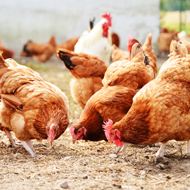Malaria-carrying mosquitos avoid chickens, study finds

Traps baited with chicken odours were found to catch significantly fewer mosquitos.
New research suggests that the smell of live chickens repels a type of malaria-carrying mosquito. The findings could one day lead to the development of new, natural mosquito repellents.
The dominant malaria vector in sub-saharan Africa is the Anopheles arabiensis mosquito. As the species feeds on hosts both indoors and outdoors, it is difficult to control with existing methods.
Research published in Malaria Journal suggests the mosquito has a strong preference for human blood when seeking hosts indoors and randomly feeds on cattle, sheep and goats outdoors. But it appears to avoid chickens, even when they are in relatively high abundance.
A. arabiensis primarily uses its sense of smell to locate hosts. Scientists from the Swedish University of Agricultural Sciences and Addis Ababa University studied the insect's behaviour in three villages in western Ethiopia, where is it common for people to share living quarters with their livestock.
The research team collected hair, wool and feathers from cattle, sheep, goats and chickens and identified scent compounds that are unique to each, before exploring how well they repelled the mosquitos.
Traps baited with chicken odours were found to catch significantly fewer mosquitos. Similar effects were seen when a caged chicken was suspended near the traps. The findings suggest these compounds could provide protection to those at risk of mosquito bites, alongside existing control programmes.
Malaria continues to be a major public health issue in sub-saharan Africa. Last year, the region accounted for 88 per cent of the world's malaria cases, and 90 per cent of malaria deaths.
It is not yet known why mosquitos appear to a avoid chickens, but scientists suggest it could be that chicken blood offers poor nutritional rewards. Another possibility is that, as chickens actively feed on mosquitos, the insects may have evolved to avoid their scent.
Future research will aim to find out how effective and long-lasting a repellent product may be.



 The veterinary mental health charity Vetlife is inviting the veterinary community to join it for a sponsored cold-water dip.
The veterinary mental health charity Vetlife is inviting the veterinary community to join it for a sponsored cold-water dip.